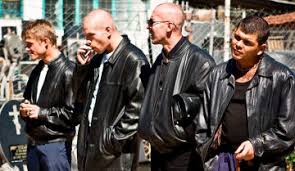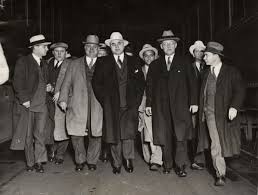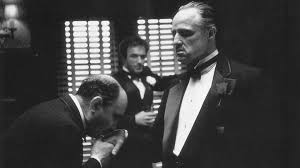(written by O.R.)
 Left to Right: Minister of the Environment, Minister of Health, Minister of Culture, Minister of Finance
Left to Right: Minister of the Environment, Minister of Health, Minister of Culture, Minister of Finance
Recent conflicts and slowly growing political tensions in Russia are associated with prolonged economic stagnation and decline in some industries. In fact, this has been going on since 2013. The problem is that the Kremlin has created an unviable and unsustainable economic system.
The state controls about 70% of the Russian economy according to the IMF, and 40- 50% according to some other estimates. However, within the state there is a narrow group of people with criminal roots and at the same time with roots in the KGB. They control the whole pyramid of power and money.
This strange alliance was formed in the 90s of the last century, during the so-called “Great criminal revolution”. It was a time when criminal organizations were merged with the security forces of the state and became owners of businesses and, at the same time, were engaged in extortion of money from businesses.
Sometimes they are unofficially called “The Cooperative Lake ” because of the name of organization, which gained for them the land for the construction of country houses in the past.
There are about 60 people. This is the highest oligarchy. It is as if Al Capone had become President of the United States and at the same time he and his friends from Cosa Nostra had controlled the court, police, army, media and state companies that produce 50% of GDP.
Even big independent businessmen are nothing more than clowns in the hands of these people. They “tilted” business. This word in modern Russian means both squeezing money (racketeering) and sexual humiliation. This definition fully reflects the psychology of the higher power and it was used in an interview, a kind of confession by one of the highest authorities in the elite (in this context the word means “squeezing money”, but at the same time, it has a different meaning – rape, submission, humiliation, and was used to describe how the state squeezes money out of business; but the fact that he used this word reflects the psychology of the elite, its attitude to business and to the population). Any businessman could be jailed if he did not give them the required sum of money or if he does not give his business to another person associated with the Kremlin (this is called by the word “raiding”).
In other words, people from the higher echelons of power are at the same time the largest owners and the biggest gangsters. In some sense they own everything in the country.
 “Capitalism gives all of us a great opportunity if we seize it with both hands and hang on to it.”
“Capitalism gives all of us a great opportunity if we seize it with both hands and hang on to it.”
– Al Capone
This elite is not monolithic. There are conflicts among its representatives. Some of them control powerful state agencies. Putin plays the role of the regulator. They call him “Dad”.
Law does not exist for them. They can do whatever they want. Principles of bourgeois law, created by the French or British revolution, don’t exist in Russia. At the same time according to the estimates of Russian economists: from 40 to 60% of state money is stolen regularly by public and private companies and government officials during the “Saw cut” of public loans and subsidies. Today people in Russia do not usually say “steal”, they say ” saw”.
Political and economic interests cannot be separated here. The same people have the highest power and wealth.
This society is reminiscent of some pre-capitalist countries, such as absolutist France or some Eastern or Oriental despotism where the economy was dominated by state ownership.
On the other hand, Russia is part of the global economy. Russia is a gas and petrol station for the European Union and the best investor of petrodollars in the EU economy. Half of Russian exports go to Europe (oil, gas and other raw materials). 70-80% of the demands of Russian industry come from foreign and largely European goods (machines and other equipment). 50% of food is imported. 93% of Russian medicine is either produced abroad or contains foreign components. The Russian state is totally dependent on Western technology, and 50% of the income of the Russian budget comes from oil and gas exports. If energy prices fall, the Russian budget collapses.
Most Russian state corporations are unprofitable. There are two reasons for this:
1) the system of state socialism/nationalization (or state capitalism, if you like), in which the company can always rely on subsidies from the State, and therefore does not rationalize production.
2) corruption of enormous proportions.
In order to appease the Kremlin’s friends who run these companies, the regime regularly raises taxes on working people and businesses. The increase in taxes and “Raiding” make private investment less profitable. As a result, the number of people with their own businesses has halved over the past 10 years, from 15 per cent to about 7 per cent of the population. Western sanctions have added to the problems and led to the outflow of foreign and Russian capital abroad.
This economic model is doomed. In Russia, according to official figures, 20 million people live below the poverty line, but in fact their number is much higher.
Incompetence, theft and wrong decisions lead to big man-made catastrophes, which are becoming more frequent. So, giant forest fires in Siberia are associated with erroneous administrative measures and cuts in forestry costs. As a result, several cities suffocated due to smoke, which caused anger amongst the local population. The longest protest in Russia, which has been going on for a year, is taking place in the Arkhangelsk region, near the city of Shies, because the government wants to create a big garbage dump there.
Putin cannot reform this system – a system that is inefficient and poorly functioning – because it is run by his friends and appointees, and if he loses them, he may lose power.
Economic and environmental distress is the main reason for the growing political tension and the gradual increase in protests in Russia.
To be continued….

Leave a Reply